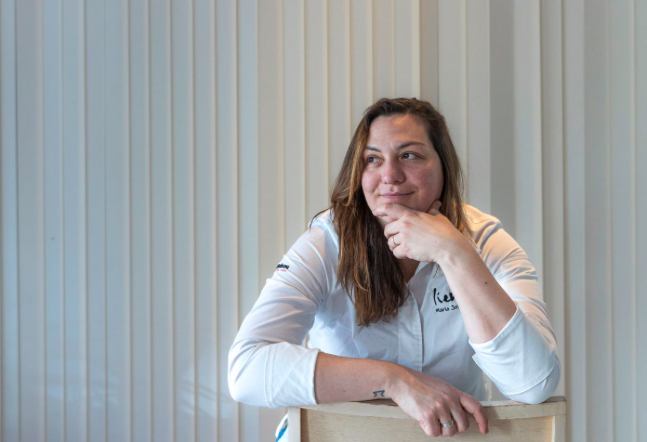La publicación The Limited Times reproduce el artículo que ya publicara El País anteriormente. os dejamos el artículo al completo a continuación.
María José Martínez, chef at Lienzo: «What sense does it make to put gold paper on top of a T-bone steak»

Defender of urban beekeeping, she has made honey the hallmark of her restaurant, with a Michelin star in Valencia, and uses it in all her dishes
It is the queen of the honeycomb.
A childhood wish.
María José Martínez grew up among orchards and beehives in Alhama de Murcia, where she was born 38 years ago.
Already then, while she sucked honeycombs as if they were sweets, she heard the elders say that if she did not take care of the environment, there would be no bees and with them the flats would disappear.
She was referring to flat peaches, also known as paraguayos, which she likes so much.
There she began to ruminate her particular crusade to save these insects, necessary for environmental biodiversity.
And she does it on several fronts, as a disseminator and as a cook at the Lienzo restaurant (one Michelin star and one Repsol sun), which she runs with her partner, Juanjo Soria, and where she impregnates the gastronomic proposal of she.
He began timidly by filtering this sweet fluid into the small cakes with which a meal ends.
She knew little by little.
She decided to gamble and use honey in all the dishes that make up her menu.
Ask.
She is known as the cook of honey.
Answer.
It came from my family, plus I come from a place where there is a lot of honey.
I was also influenced by a cave painting that we have in Bicorp, La Cueva de la Araña, and it has a representation of a woman with a basket in a cut collecting honey, with the bees hovering.
Honey and bees have only given me happiness.
And I have been able to apply it to the kitchen, which is what I like the most.
I do not come from a hotel family, but I am fond of cooking.
I cook memories.
Q. You defend urban beekeeping and collaborate with the Valencia City Council in promoting beehives in the city.
S.
This began in 2015, with the project launched by the Valencia Tree Observatory (OMAV) to help firefighters remove swarms from certain sites and create a municipal apiary.
Now there are about 24 beehives in four places in the city, such as Jardines del Real, Malilla, Patraix and La Seu, but it is necessary to disseminate and support the project and for urban beekeeping to return.
In France or the United Kingdom it is normalized.
More information
Elena Arzak: «I’d be sorry, but I’m prepared to lose a Michelin star»
Q. Bees are usually scary.
R.
Today everything is annoying, everything is scary.
We also occupy natural spaces and are scary.
We need them so that they pollinate and contribute to the environmental biodiversity, that is what allows us to live.
Beekeeping is transhumance, it helps to measure where pollution is going in the world.
It is a gauge of how the environment is doing.
If cities had more bees we would be happier.
They have never been so necessary.
Q. Do you maintain the same speech in all the genre with which you cook?
R.
I use all organic and local products.
The fish is from the market, although I have also started to buy some from the fish farm.
I don’t know how the issue of the sea will end, because we are not taking care of the seabed.
Within this sustainability discourse, the bee is the queen, without it pollination would not be possible.
I never tire of saying it.
Q. Are there few beekeepers left in Spain?
A.
Very few.
Beekeepers are not helped as they should be.
It is not easy for them to do their job.
There are 35,300 beekeepers in rural areas [the data comes from the General Registry of Livestock Farms (REGA). They are few if compared to the number of bars and restaurants. In addition, it has to be a profitable business. And today it is not so profitable .
Q. Why?
R.
Because there is a lot of fraud in honey.
Lots of cheap, adulterated honey is sold.
Good honey costs money to make and no one is surprised that it costs between 10 and 20 euros.
You can put honey from Spain on the label, and that 50% is from here and the rest is of unknown origin.
It is important to see how the hives are treated, how the wax is cleaned, that is worth a lot of money.
The hives have to be very clean.
I advise buying honey from beekeepers and avoiding industrial ones.
View this post on Instagram
A post shared by Restaurante Lienzo (@restaurante_lienzo)
Q. Why is there so much ignorance about honey?
R. People have been little interested, it is always associated with a cloying product and it is not like that.
People are more interested in the latest generation mobile, wearing expensive clothes or thelikes
of social networks, than worrying about what is truly important.
I use everything from the world of bees, propolis, wax, pollen…
Q. Is creative cuisine seasoned with too many expensive products?
A.
Everything has to make sense and the price has to be reasonable for the client.
We have oyster producers from Valencia, it is kilometer zero, and there is a job behind it.
Like with caviar.
I run away from everything that means putting gold foil on a plate.
It is very elitist and it is something that does not interest me.
What sense does it make to put gold foil on top of a steak.
Or throw the salt on the table from above as a show.
We are distorting gastronomy.
Q. Can you be imaginative with simple products?
A.
Much can be done.
The important thing is not to spoil them.
We have a cauliflower dish, which people love, or somebobby green beans,
which I prepare in a clay dish with cod pil pil.
They are products that you do not expect in a gastronomic restaurant.
I work with nearby farmers, who do not cultivate monocultures, and this, in addition to being good for biodiversity, shows in the flavor and texture of the product.
Chef María José Martínez, at the Lienzo restaurant, on April 4, in Valencia. Mònica Torres
Q. Is specialization in the kitchen important?
R.
I have sought my path.
There are people who always criticize what others do, but it’s nice to have a cause.
If you only fill the belly and the ego is an empty life.
You also have to have an altruistic point.
I want that I do it to be useful for something, and that the client leaves the restaurant with a message and remembers me.
I don’t believe myself more than anyone else, but I do like to make the client aware of something I believe in.
I want my hive to stay alive and I don’t get into conflicts with anyone.
Q. Is Lienzo a profitable restaurant?
R.
I have 13 employees and you have to work hard to get it going.
Now we want to fix and improve it.
There is a slightly ugly fashion, and that is that to be a good cook you also have to be an entrepreneur.
A chef who owns many restaurants is neither wiser nor better than anyone else.
There is too much pressure in this regard.
I will not live such an interesting life, but my boat is sustainable, it works and it has to be profitable.
A young man who opens a restaurant has to get a star, and the important thing is to enjoy the process, live in the moment and be patient.
There is no need to get everything immediately.
The life is other thing.
Q. Do you miss that there are more women on the front line of the kitchens?
R.
I think that when there are women who measure up, they are valued.
In the Valencian Community we are a lot, but always.
At Casa Pepa, in La Sucursal, there have been women with a Michelin star.
We have had pioneers and those of us who have come later have fitted the glass shoe well.
Over time there will be more.
Source: elparis





